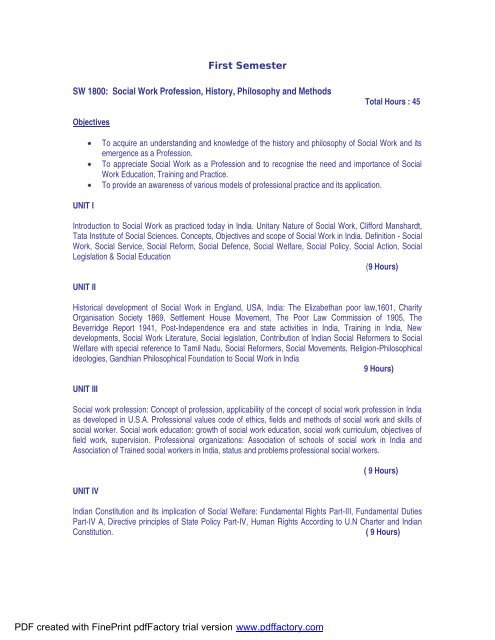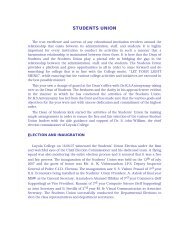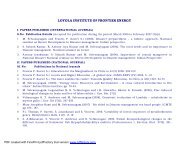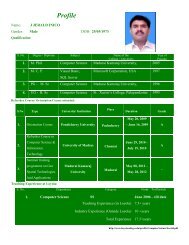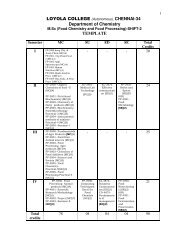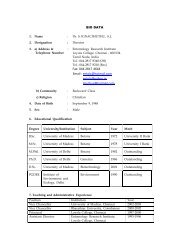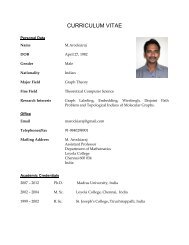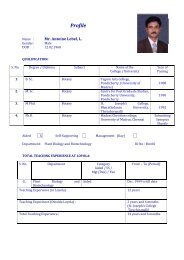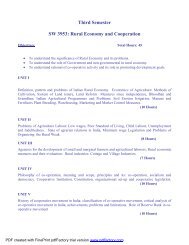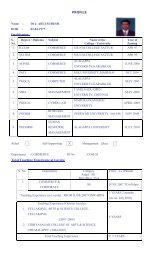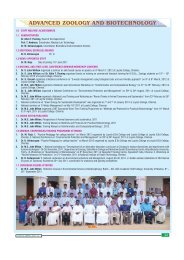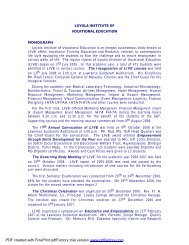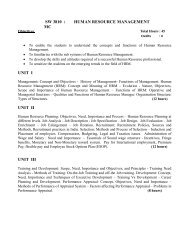First Semester SW 1800: Social Work Profession ... - Loyola College
First Semester SW 1800: Social Work Profession ... - Loyola College
First Semester SW 1800: Social Work Profession ... - Loyola College
Create successful ePaper yourself
Turn your PDF publications into a flip-book with our unique Google optimized e-Paper software.
UNIT VVoluntary social work: Role of Government and voluntary organizations in promoting social welfare.Changing trends in social work and the role of social worker and the government in promoting social workprofession in India.( 9 Hours)References1. Arthur Fink, 1978 The Field of <strong>Social</strong> <strong>Work</strong>, HOLT, Rinehart &Winston, New York2. Dasgupta.,1967 Towards a Philosophy of <strong>Social</strong> <strong>Work</strong> in India,Popular Book Services, New Delhi3. Gangrade,K.D,1976 Dimensions of <strong>Social</strong> <strong>Work</strong>, Indersing Marwah forMarwah Publications, New Delhi4. Gore.M.S,1965<strong>Social</strong> <strong>Work</strong> and <strong>Social</strong> <strong>Work</strong> Education, AsiaPublication house, Mumbai5. Jainendra Kumar Jha, 20026. Joshi.S.C, 2004Practice of <strong>Social</strong> work, Anmol Publications, NewDelhi.The Handbook of <strong>Social</strong> work, Akansha PublishingHouse, New Delhi.7. Kunduka.S.K,1965 <strong>Social</strong> <strong>Work</strong> in India, Sarvodaya sahitya samaj,Jaipur8. Paul Chowdry,20009. Sanjay Bhattacharya, 200310. Wadia.A.R., 197211.. Walsh Joseph, 2006Introduction to <strong>Social</strong> <strong>Work</strong>, ATMA RAM & SONS,Delhi<strong>Social</strong> work – An Integrated Approach, Deep &Deep Publications Pvt Ltd, New Delhi.History and Philosophy of <strong>Social</strong> <strong>Work</strong> in India,Allied Publishing House.Theories of of Direct <strong>Social</strong> work practice, ThomsonBrooks, Cole.PDF created with FinePrint pdfFactory trial version www.pdffactory.com
<strong>SW</strong> 1801: Sociology and Indian SocietyObjectives: Total Hours : 45• To provide the students a sociological perspective on Indian society, its structure,history and problem.• To sensitize them to the need to acquire suitable skills to deal with social issues.• To help them acquire attitudes to society on its problems that are appropriate tothe profession.UNIT IIntroduction to Sociology : Definition, Nature, Scope and Importance of Sociology;Major Theoretical Perspectives: Functionalist, Conflict and Interactive; Sociology as a<strong>Social</strong> Science.( 9 Hours)UNIT IIEvolution of Sociology: Contributions of August Comte, Herbert Spencer, Karl Marx,Emile Durkheim, Max Weber and M.N. Srinivas; Recent Developments in the branchesof Sociology - Urban, Rural, Religious and Political Sociology. ( 9 Hours)UNIT IIIBasic Concepts in Sociology: Society, Community and Association - Meaning andcharacteristics; <strong>Social</strong> Systems and <strong>Social</strong> Institutions - Family, Religion, Marriage,Education, Politics, Economics, Medicine and Recreation; <strong>Social</strong> Structure - Role andStatus, Power and Authority; Culture - Meaning and Characteristics; <strong>Social</strong> Groups:Definitions, Characteristics, Importance, Classification of <strong>Social</strong> Groups; <strong>Social</strong>Processes: <strong>Social</strong> Interaction, Cooperation, Competition, Conflict, Subjugation,Accommodation and Assimilation;( 9 Hours)UNIT IV<strong>Social</strong> Control: Meaning, Purposes, Types, Mores, <strong>Social</strong> Norms and Values, Conformityand deviance, <strong>Social</strong> Change; <strong>Social</strong> Stratification and Mobility: The class and castesystem; <strong>Social</strong> Lag, Sanskritization, Westernization Globalization and Modernization.( 9 Hours)PDF created with FinePrint pdfFactory trial version www.pdffactory.com
Unit VIndian <strong>Social</strong> Problems: Poverty, Illiteracy, Casteism, Gender Inequality, Over-Population, Environmental Threats, Unemployment, Corruption, Crime andDelinquency, Suicide, Child Labor, Bonded Labor, Terrorism, Prostitution, Linkagebetween Sociology and <strong>Social</strong> <strong>Work</strong> Practice.( 9 Hours)References:Bottomore, T.B,1980Elliot & Merril, 1982Ghurye, G.S. 1995Kapadia, K.M., 1997: Sociology: “A guide to Problems andLiterature”, McGraw hill, New Delhi: Society and Culture, Prentice Hall Inc: Caste, Class and Occupation, Bombay,Popular Prakashan: Family and Marriage in India, OxfordUniversity Press.Kingsley, Davis, 1998MacIver and Page, 1976Madan, G.R.Rao, C.N.S. , 2002: Human Society, Asian Publication,Mumbai: Society: an Introductory Analysis,Macmillan: Indian <strong>Social</strong> Problems, Vol I andII: Sociology: Primary Principles, SultanChand , Mumbai.Rao M, 1988Srinivas, M.N, 1966Vidya Bhushan & Sachdeva, 1999:Urban Sociology in India,Orient Longman, New Delhi.: <strong>Social</strong> Change in India, OrientLongman: Introduction to Sociology, KitabMahal, New Delhi.PDF created with FinePrint pdfFactory trial version www.pdffactory.com
Role of the <strong>Profession</strong>al <strong>Social</strong> <strong>Work</strong>er in promoting Community Health and CommunityMental Health.( 6 Hours)References:Ahuja, Niraj., 2005Berrios, G.E & Dawson, J.H, 1983Coleman James. C, 1975Desouza.A, 1975Hurlock, Elizabeth., 2001Nanda, V.R, 1997Park. J.E & Park. K, 2003WHO, 2004A Short textbook of Psychiatry, HimalayaPublishing House, New DelhiTreatment and Management in AdultPsychiatry, Bailiere Tindall, London.Abnormal Psychology and Modern Life,D.B. Taneporevela, Mumbai.Psychiatry in India, Bhalani Book DepotMedical Booksellers, MumbaiDevelopmental Psychology, Tata Mc GrawHill, New York.Health Education, Amol Publication,New Delhi.Text Book of Prevention and <strong>Social</strong>Medicine, Bansaridas Bhanot, Jabalpur.The ICD – 10 Classification of Mental andBehavioural Disorders, Diagnostic Criteriafor Research, AITBS Publishers andDistributors (Regd.), DelhiWeb Siteshttp://www.icmr.nic.inwww.who.int/csr/resources/publicationsPDF created with FinePrint pdfFactory trial version www.pdffactory.com
<strong>SW</strong> 1803: Introduction to <strong>Social</strong> Case <strong>Work</strong> and <strong>Social</strong> Group<strong>Work</strong>Total Hours: 45PART – A<strong>Social</strong> Case <strong>Work</strong>Objectives• To understand the values and Principles of <strong>Social</strong> <strong>Work</strong> and to develop the capacity to practicethem.• To develop in students an understanding of and an ability to adopt a multi-dimensional approachin assessment and interventions.• To understand and apply the models of <strong>Social</strong> Case <strong>Work</strong> practice in different settings.UNIT INature, Definition and objectives of <strong>Social</strong> Case <strong>Work</strong>; its relation to other methods of <strong>Profession</strong>al <strong>Social</strong><strong>Work</strong>. Historical developments of Case <strong>Work</strong> in USA and India. Philosophy and Principles of <strong>Social</strong> <strong>Work</strong>.Components of Case <strong>Work</strong>; the Person, The Place, The problem and the Problem Solving Process. Phasesof Case <strong>Work</strong>; Initial Phase, Appraisal or assessment, helping phase and termination, techniques of casework of each phase(8 Hours)UNIT IIHelping techniques: Interviewing, environmental modification, supportive techniques, home visits,collateral contacts and referrals. Client-<strong>Work</strong>er Relationship: Definition, use and characteristics.Transference and Counter –Transference and their use in diagnosis and treatment.( 7 Hours)UNIT IIICase <strong>Work</strong> Recording: use of Case <strong>Work</strong> Recording, structure and content of Case <strong>Work</strong> records –methods of recording: Verbatim, narrative, condensed, analytical and summary records; Supervision anddevelopment of personal and professional self( 7 Hours)Part B<strong>Social</strong> Group <strong>Work</strong>Objectives`• To understand <strong>Social</strong> Group <strong>Work</strong> as a method of <strong>Social</strong> <strong>Work</strong> and apply it as a method ofintervention.• To gain knowledge of the scope of this method in various settings.• To develop skills to apply the method for development and therapeutic workUNIT IVDefinition of <strong>Social</strong> Group <strong>Work</strong>- Philosophy, Objectives, as a method in <strong>Social</strong> <strong>Work</strong>, its relation to other,<strong>Social</strong> <strong>Work</strong> methods. Historical development, current trends, its relevance and scope. Group- definition,types, characteristics, life as a process of adjustment with different types of groups, psychological needsthat are being met in groups. Role of groups in personality development(8 Hours)PDF created with FinePrint pdfFactory trial version www.pdffactory.com
UNIT VGroup Process: Bond, acceptance, isolation, rejection, subgroups, conflict and control, functional and nonfunctionalrole of individuals in group, tools for assessing group interaction- sociometry. Group <strong>Work</strong>process-intake, study, objectives, goal settings, evaluation. Developmental stages.(8 Hours)UNIT VIProgrammes as a tool- principles of programme planning, programme media, programme developmentprocess. <strong>Work</strong>er – Role, skills, qualities, principles of <strong>Social</strong> Group <strong>Work</strong>. Recording- purpose, types,supervision, Group <strong>Work</strong> Administration.(7 Hours)References:Ammet.Garrett, 1962Balagopal and Vassily, 1983Banerjee, 1977Brown, 1991Cory & Cory, 1982Konopka, 1983Goldstein, Eda & Noonan,Maryellen,1999Hamilton, Gorden, 1955Mathew, Grace, 1992Interviewing: Its Principles and Methods, Family Serviceassociation, New York, USAGroups in <strong>Social</strong> <strong>Work</strong>, Macmillan Publishers, New York,USA.Papers on <strong>Social</strong> <strong>Work</strong>- An Indian Perspective, TISS, Mumbai,IndiaGroups for growth and change, Longman Publishers, NewYork, USAGroups: Process and Practice, C.A.Brooks/Cole Publishers,Monterey.<strong>Social</strong> Group <strong>Work</strong>: A helping Process, Prentice Hall, NewJersy, USAShort-Term Treatment and <strong>Social</strong> <strong>Work</strong> Practice: AnIntegrative Perspective, Free Press , USTheory and Practice of <strong>Social</strong> Case <strong>Work</strong>, Columbia UniversityPress, New York, USAAn Introduction of <strong>Social</strong> Case <strong>Work</strong>, TISS, Mumbai, IndiaPearlman, Helen, 1995Robert W,Roberts Robert H. Nee,2000Trecker, 1983<strong>Social</strong> Case <strong>Work</strong>: A Problem Solving Process, The Universityof Chicago Press, Chicago, USATheories of <strong>Social</strong> Casework, Univ of Chicago Press, Chicago.<strong>Social</strong> Group <strong>Work</strong>: Principles and Practice, New YorkAssociation Press, New York, USA.Upadhyay, R.K, 2003 <strong>Social</strong> Casework : A Therapeutic Approach, rawatpublications, IndiaPDF created with FinePrint pdfFactory trial version www.pdffactory.com
Second <strong>Semester</strong><strong>SW</strong> 2800: Community Organisation and <strong>Social</strong> ActionPART – ACommunity OrganisationObjectivesTotal Hours 45• To get a clear understanding of the various types, dimensions, components andcharacteristics of the community.• To understand need assessment as an approach in community work along with thedifferent steps to assess the community needs and to link them with the resources.UNIT ICommunity Organisation – Definition, objectives and a brief historical development ofCommunity Organisation in UK, USA and India. Community – meaning, types, structureand dynamics, with special reference to India. Leadership – concept, leadership pattern inIndian Communities.(8 Hours)UNIT IICommunity Organisation as a method of <strong>Social</strong> <strong>Work</strong>. The similarities and differencesbetween Community Organisation and community development. The phases ofCommunity Organisation – Study, Analysis, Assessment, Discussion, Organisation,Action, Evaluation, Modification and Continuation. The various models of CommunityOrganisation as practiced in our country.(7 Hours)UNIT IIICommunity Organisation – principles and approaches, Roles of the CommunityOrganisation worker. Methods and skills in Community Organisation. Use of <strong>Social</strong><strong>Work</strong> methods in Community Organisation. Use of Community Organisation in thevarious fields of <strong>Social</strong> <strong>Work</strong>, with special reference to India.(7 Hours)PART - B<strong>Social</strong> ActionObjectives:• To study the ways and means of social problems and understand the channel tosolve them.PDF created with FinePrint pdfFactory trial version www.pdffactory.com
• To bring changes in the social structure and to modify the malfunctioning of thesocial and economic institution without violence and coercion.UNIT IV<strong>Social</strong> Action – definition, objectives, social action as a method of <strong>Social</strong> <strong>Work</strong>, <strong>Social</strong>action for social reform, social action and social movement, social action for socialdevelopment. Concept of Justice, concept of social justice and distributive justice socialaction for social justice.(8 Hours)UNIT VProcesses of social action – principles, methods and strategies. Scope of social action inIndia, social action to deal with social problems in India, social legislation as a measureof social action, enforcement of social legislation through social action. Differentapproaches and social action adopted by Paulo Friere, Saul Alinsky, Ravy and Gandhiji(8 Hours)UNIT VI<strong>Social</strong> movement, concept, type Sarvodaya, D.K.Dalit, naxalbari movements. <strong>Social</strong>worker and social activism, role, functions and personality requirements of a socialactivist, problems in social activism. Schools of social work and social action.(7 Hours)Reference:Chowdhry, D. P. 1976.Introduction to <strong>Social</strong> <strong>Work</strong>, Atma Ram, New DelhiFriedlander, W. A. (Ed). 1977. Concepts and Methods of <strong>Social</strong> <strong>Work</strong>, Prentice Hall of India Pvt. Ltd.,New Delhi.Gangrade, K.D. 1971 Community Organisation in India, Popular Prakashan, Mumbai.Indian <strong>Social</strong> Institute, 1980.Martin Luther King 1968.Rao, N.S.A 1984.Synod of Bishop, Promotion of <strong>Social</strong> Justice, NewDelhi.Where do we go from here, chaos or community?Bantam Books, New York.<strong>Social</strong> movement in India, Manohar Publishers,New Delhi.Siddique, H. Y. (Ed.) 1984. <strong>Social</strong> <strong>Work</strong> and <strong>Social</strong> Action, HarmanPublications, New Delhi.PDF created with FinePrint pdfFactory trial version www.pdffactory.com
<strong>SW</strong> 2801: <strong>Social</strong> <strong>Work</strong> Research & StatisticsObjectives :Total Hours : 45• To help the student to understand <strong>Social</strong> research as a method of social workand to develop the appropriate skills to effectively implement the researchmethods and techniques in the field.• To facilitate better understanding of the current trends and practices in <strong>Social</strong>work research• To enable the students to understand the importance of statistics application in<strong>Social</strong> work research.UNIT IDefinition and objectives of research and social work research. Scope, present position,agencies for promoting and conducting social work research. Nature of scientific enquiry.Scientific attitude.Basic elements of scientific method: concepts, assumptions.Hypothesis, theory, law-conceptual and operational definitions. Cause-effectrelationships and difficulties in establishing causal relations in social work research.( 7 Hours)UNIT IIIdentification and formulation of research problems-criteria. Research project: meaningand major steps of a research project. Research design: definition, importance and types,random observation, explorative, formulative, descriptive diagnostic and experimentalmethods. Methods of social research: social survey, case study, and historical, statisticaland experimental methods.( 7 Hours)UNIT IIISampling definition, purpose and kinds, probability and non-probability sampling.Sources and types of data: primary and secondary, subjective and objective, quantitativeand qualitative data. Methods and tools of data collection: observation, questionnaireinterview schedule, interview guide, interview, scaling techniques, etc. Procession,analyzing and interpreting of data preparation of research report. Qualitative Researchmethods for <strong>Social</strong> work.(10 Hours)UNIT IVNature and purpose of statistics – use of statistical methods and limitations of statistics.Statistical data, social statistics-nature and sources. Tabulation of data – purpose andbasis of classification. Frequency distribution-construction of frequency tables, graphicpresentation of data-Bar chart, pie chart, histogram, frequency curve, ogive, etc.(7 Hours)PDF created with FinePrint pdfFactory trial version www.pdffactory.com
UNIT VMeasures of Central tendency: Mean, Median and Mode. Measurers of dispersion:Range, Quartile deviation, Average deviation, Standard deviation, Coefficient ofvariation - Skewness.( 7 Hours)UNIT VICorrelation: pearson’s Coefficient of correlation (ungrouped data) Rank differencecorrelation. Normal distribution – meaning and important properties. Significance tests:Pearson’s chisquare statistics-goodness of fit test, test for independence of attributes, ‘t’test, analysis of variance-one-way and two-way classifications.( 7 Hours)Reference:1. Alan Bryman, 2004 <strong>Social</strong> Research Methods, OxfordUniversity Press, New York.2. Darin Weinberg, 2002 Qualitative Research methods, Blackwellpublishing, UK3. Earl Babbie, 1998 Adventures in <strong>Social</strong> research using SPSS,Pine forge press, New Delhi4. Gupta.S.P, 2005 Statistical Methods, Sultanchand publishers,New Delhi5. Kothari. C.R, 2004 Research Methodology, NAI Publishers,` New Delhi6. Janet M. Ruane, 2005 Essentials of Research Methods, Blackwellpublishing, UK7. Lakmi Devi, 1997 Encylopaedia of <strong>Social</strong> research, Anmolpublications, New Delhi, Vol I, II & III8. LalDas .D.K., 2000 Practice of <strong>Social</strong> Research, RawatPublications, Jaipur9. Sarantakos, 2005 <strong>Social</strong> research, Palgrave Macmillan,New york10. Vijay Rohatgi, 2001 An Introduction to probability and statistics,A Wiley – Interscience publication – Johnwiley & sons Inc, New york.PDF created with FinePrint pdfFactory trial version www.pdffactory.com
<strong>SW</strong> 2802: <strong>Social</strong> <strong>Work</strong> Administration and <strong>Social</strong> LegislationPart I<strong>Social</strong> <strong>Work</strong> AdministrationObjectives : Total Hours : 45UNIT I• To acquire Knowledge of the basic process of administration• To understand the procedures and policies involved in establishing and maintaining social welfareorganisations• To develop skills to participate positively in administrative process<strong>Social</strong> <strong>Work</strong> Administration: Definition, Characteristics, <strong>Social</strong> <strong>Work</strong> Administration as a method of <strong>Social</strong><strong>Work</strong> - <strong>Social</strong> <strong>Work</strong> Agency: Organisational structure, Boards and committees: Executive: Functions &Qualities - Administrative Process: policy formation, Planning decision making, Co-ordination,Communication. (7 hours)UNIT IIPersonnel administration: Selection of staff, orientation, placement, service conditions, promotions,discipline, welfare programmes for staff -- Financial administration: budgeting, accounting, bookkeepingand fund-raising -- Office administration: office management and maintenance of records -- Supervision,evaluation and public relations.(7 hours)UNIT IIIA study of: Central <strong>Social</strong> Welfare Board, State <strong>Social</strong> Welfare advisory Boards – Indian Council of<strong>Social</strong> Welfare – Indian Council of Child Welfare- Nehru yuvek Kendra – Y.M.C.A – C.A.SA. –C.A.R.E. Ministry, Department of <strong>Social</strong> Welfare--Role of voluntary agencies in social welfareproblems faced by voluntary agencies. Co-ordination and co-operation between voluntary andgovernment welfare agencies. (8 hours)Part II<strong>Social</strong> LegislationObjectives:• To enable students to apply prevailing laws for redressal in the case of victims of and violation ofHuman Rights• To make the students understand the mechanisms of utilising <strong>Social</strong> Legislation as a criticalinstrument of <strong>Social</strong> Transformation.• Students will apply the basic components of particular laws to enable social Justice to Weaker andVulnerable Sections of Society.UNIT IVLegislation as an instrument of <strong>Social</strong> Change and <strong>Social</strong> Welfare: Introduction to <strong>Social</strong> Legislation;Hindu, Muslim and Christian Personal laws on Marriage, Divorce, Maintenance, Guardianship andSuccession .Legislation for Public Good: Protection of Human Rights Act, 1993;Consumer Protection Act, 1986; Right to Information Act, 2005; The Patents (Amendment) Act, 2005;Rural Employment Guarantee Act, 2005.(8 Hours)PDF created with FinePrint pdfFactory trial version www.pdffactory.com
UNIT VLegislation and Guidelines pertaining to Children: Child Marriage restrained (Amendment) Act, 1978; Child Labour(Prohibition and Regulation) Act, 1986; Central Adoption Resource Agency Guidelines, 1991; Pre Natal DiagnosticTechniques Act, 1994. The Juvenile Justice (Care and Protection of Children), Act 2000; Legislation and Guidelinesrelated to Women: Prevention of Immoral Traffic Act, 1956; Dowry Prohibition Act, 1961; Medical Termination ofPregnancy Act, 1978; Indecent Representation of Women Act, 1986; Domestic Violence Act, 2005. SexualHarassment in <strong>Work</strong> Place Guidelines. Legislation and Guidelines concerning <strong>Social</strong>ly Disadvantaged: Bonded LabourSystem (Abolition) Act, 1976; The Mental Health Act, 1986; The SC/ST (Prevention of Atrocities) Act, 1989 & Rules1995, The Persons with Disabilities (Equal Protection of Rights And Opportunity and Full Participation) Act, 1995.(8 Hours)UNIT VIPublic Interest Litigation, Legal Aid in India and Role of <strong>Social</strong> <strong>Work</strong>ers in the enactment andimplementation of <strong>Social</strong> Legislation and promotion of <strong>Social</strong> Justice. Issues pertaining to harmful customsand practices- Sati, Eve Teasing, Ragging, and Public Health Hazards(7 Hours)References:Chandru, Geetha. 1998Chowdry, Paul. 1992Sankaran and Rodrigues, 1983Shanmugavelayutham, K, 1998Subba,Rao G.C.V, 1999Sulivan, Michael. 1987Child and Law in India, Indian Council for Child Welfare,Chennai<strong>Social</strong> Welfare Administration, Atma Ramand Sons, Delhi.Handbook for the Management of VoluntaryOrganisations, Alpha Publications, Chennai.<strong>Social</strong> Legislation and <strong>Social</strong> Change,Vazha Valamudan Publishers, Chennai.Family Law in India, S.Gogia andCompany, Hyderabad.Sociology and <strong>Social</strong> Welfare, Allen andUnwin, Winchester, USA.Journals :Combat lawEconomic and Political WeeklyWomen’s collective<strong>Social</strong> ScientistWebsites:www.nic.inwww.supremecourtofindia.nic.inwww.judis.nic.inwww.indiancourts.nic.inwww.pucl.orgwww.lawyerscollective.orgPDF created with FinePrint pdfFactory trial version www.pdffactory.com
<strong>SW</strong> 2803: ADVANCED SOCIAL CASE WORK AND SOCIALGROUP WORKPart ATotal Hours : 45<strong>Social</strong> Case <strong>Work</strong>-IIObjectives:• To understand the scope of <strong>Social</strong> Case <strong>Work</strong> in different settings and develop the capacity topractice them.• To develop in students an understanding of and an ability to adopt a multi-dimensional approachin assessment and interventions.• To understand the scope <strong>Social</strong> Case <strong>Work</strong> practice in Indian societyUNIT IFamily and Child Welfare settings, Medical and Psychiatric Settings, Correctional settings, Industrialsettings, Community Development settings, Marriage Guidance and Counselling.( 7 Hours)UNIT IIRecent Developments in <strong>Social</strong> Case <strong>Work</strong>: Short Term Case <strong>Work</strong>, Preventive Case <strong>Work</strong> intervention,multiple interviewing, psychotherapy, similarities and difference between case work, counselling andpsychotherapy, use of psychiatric consultation and psychological tests.(8 Hours)UNIT III<strong>Social</strong> Case <strong>Work</strong> practice in Indian Society: Scope, influence of cultural factors on <strong>Social</strong> <strong>Work</strong> practice;inhibiting factors like authority dependence, social hierarchy, castes, Dharma and Karma theories and theirinfluences on Case <strong>Work</strong> practice.( 7 Hours)Part B<strong>Social</strong> Group <strong>Work</strong>-IIObjectives:• To understand the scope of <strong>Social</strong> Group <strong>Work</strong> in different settings• To gain knowledge of the group dynamics and understand the concept and theories of leadership.• To develop skills to apply the method for development and therapeutic Group <strong>Work</strong>UNIT IVGroup Dynamics : Definition – Basic assumptions – Group membership, group norm, group cohesiveness,group culture, group control, group morale, group attraction, communication and Interaction pattern,Sociometry – Problem Solving, Decision making, Goal setting, Conflict resolution. Group Leadership –PDF created with FinePrint pdfFactory trial version www.pdffactory.com


